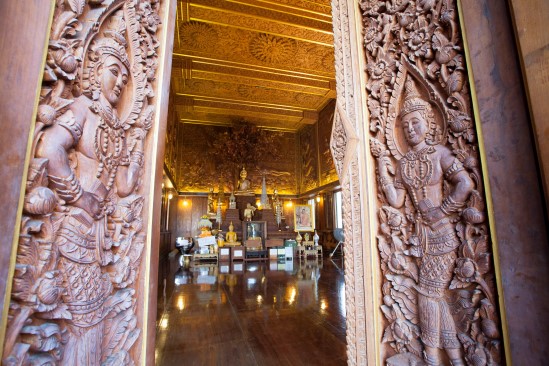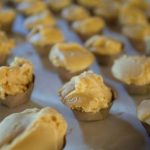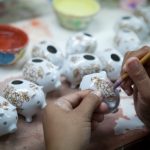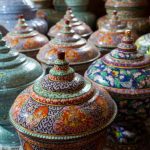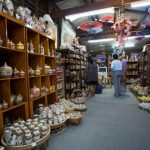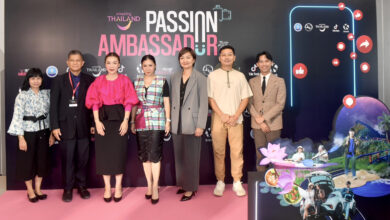Dubai, 25 April, 2017 – The Arab countries have their “souks”. Thailand has its “floating souks”. For the first time, Thailand will formally welcome visitors from the Arab World to the province of Samut Songkhram, home of some of the kingdom’s most elegant “floating souks.”
“Souk” is the Arabic word for “market”. For centuries, the Arab “souk” has been at the centre of Arab civilisation, a hub of trade and commerce. Thailand, blessed with a bountiful supply of water running through its blood vessels, the rivers and canals, has also used its floating markets as centres of trade and commerce.
This introduction, part of an innovative marketing strategy known as the LINK (L- Local Experiences, I – Innovation, N-Networking, and K-Keeping Character), was showcased by the Tourism Authority of Thailand (TAT) at the Arabian Travel Market (ATM), the Gulf region’s travel trade show, in Dubai between 24-27 April, 2017.
The LINK strategy promotes better integration among Thai tourism stakeholders, links the “supply” in the form of local destinations to the “demand” in international source markets and helps to redistribute visitor arrivals and tourism income to local communities. It introduces new and extraordinary experiences in Thailand.
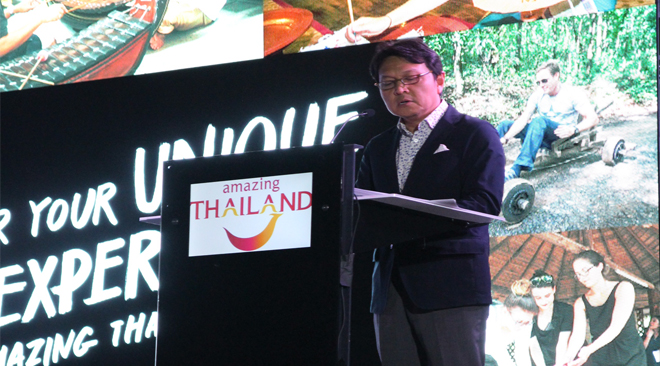
Mr. Tanes Petsuwan, TAT Deputy Governor for International Marketing – Europe, Africa, Middle East and the Americas said, “We would like to introduce Samut Songkhram province. Just 65 kilometres from Bangkok, Middle East travellers can experience the local way of life adding to the well-being or medical services they can take advantage of in the capital.
“They can experience the vivacity of Thai floating markets, which will give them options to enjoy shopping from morning till night. Samut Songkram is also home to many orchards and farms where visitors can spend their leisure time enjoying the rural greenery and canals as well as delicious fresh fruit grown and harvested there.”
Highlights of tourist attractions in Samut Songkram:
Amphawa Floating Market: The Amphawa Floating Market portrays the history of Samut Songkram as a commercial hub when waterways were the main routes for transport. Open Friday to Sunday, from afternoon to evening, the Amphawa Floating Market is becoming better known as a destination where visitors can find authentic local food, desserts, and fresh fruits from local orchards, as well as experience an atmosphere of bygone times. The canal gets busy after around 4 p.m. when vendor boats, loaded with various goods and food products, arrive at the Market site.
Part of the Amphawa Floating Market‘s charms are the old wooden shop houses built along the banks, creating a backdrop reminiscent of the town’s heyday. Besides shopping, visitors can also take boat trips to observe life along the river and watch the sparkling star-like fireflies after dusk descends. Firefly watching tours are conducted year-round, but the best season is from May to October.
Coconut Palm Sugar: The sweetness and aroma of coconut palm sugar are known as key ingredients of many Thai dishes and desserts. While it can be commonly found in Thai markets, with different grades, the premium is very difficult to procure. Those who live around the Mae Klong River basin in Samut Songkram have been producing coconut palm sugar for generations.
In communities; such as, Ban Bang Plup where the locals will demonstrate how coconut palm sugar is made in the traditional way, beginning with the coconut sap collection followed by boiling and dehydration process. Each of the several steps to be followed requires special skills and local know-how to make the best product.
Ban Bang Plup: The village of Ban Bang Plup invites visitors to experience the rural way of life of Central Thailand. The community is known not only for its efforts to preserve local traditions, but also for its green practices that the villagers apply to their agricultural activities.
In Ban Bang Plup, visitors can enjoy exploring orchards, vegetable farms and the surrounding countryside on foot or by bicycle. Various fruit, visitors will find at the orchards include pomelo, rose apple, mango, lychee, coconuts, and other seasonal varieties.
The Ban Bang Plup community will also share the local wisdom they apply in their organic farming, organic fertiliser production, palm sugar making and fruit preservation.
Ban Don Kai Dee: The village of Ban Don Kai Dee is located in Samut Sakhon, the neighbouring province of Samut Songkram. The village is well-known for the production of Benjarong, or the five-coloured enamel porcelain, one of Thailand’s finest crafts.
Ban Don Kai Dee:‘s signature pattern depicts the Thai lifestyle in the past. Other motifs, like flowers or animals, are also woven into the delicate designs.
In Ban Don Kai Dee, visitors can watch the artisans at work and learn the process of Benjarong making as well as even paint their own one-of-a-kind piece that will be fired and finished in 24 hours. Homestays in Thai-style houses amid a green setting are available.
